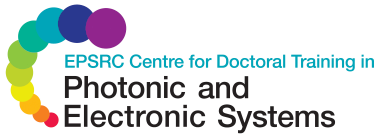Doctorate in Research (PhD) - Years 2 to 4
Aim
To facilitate high quality PhD research and in doing so provide a platform for a new generation of multi-disciplinary thinkers and innovators. PhD research project proposals are developed in collaboration with industry, through a competitive bidding process involving all departments, institutes and centres associated with the Centre. Selection of PhD research projects takes place toward the end of the first year of the course.
Participation in relevant technical courses, road mapping and business electives takes place throughout the PhD training.
Overview
Students who are awarded an MRes will be permitted to progress to the PhD stage of the programme. During the PhD students carry out their own research project under the supervision of a member of academic staff. Students will normally work within a Research Group, and closely with their supervisor(s), to develop each stage of their research.
We have a large and vibrant community of doctoral students connected to the Centre, access to world-class research facilities and opportunities to collaborate with institutions, organisations and academics world-wide.
Throughout their PhD, students will have regular meetings with their primary supervisor, contact with their secondary supervisor, and participation in group meetings. Students initially register for an MPhil degree and transfer to the PhD programme after a successful transfer/upgrade examination. The final examination for a PhD degree is by the presentation of a thesis.
Choosing a PhD research project
PhD projects for this programme are formally proposed by academic supervisors. During the MRes year students may develop a PhD research proposal with help from the CDT Management Team or Research Groups at UCL or University of Cambridge. All proposals are then then reviewed by the Centre's Research Strategy Committee.
Students are provided with an approved list of available PhD projects during their MRes year. They meet with the project supervisors to discuss their interest before submitting their PhD project choices. Supervisors provide feedback to the Committee on student's suitability. The Committee then allocate research projects to students who are continuing from MRes to PhD.
A list of recent research projects can be found on our Projects page.
Supervision and mentoring
With guidance from the Centre Directors and academic supervisors students will identify suitable supervision arrangements - which will depend on the nature of the research project. You will be registered at the university of your first (principal) supervisor. Your principal or first supervisor, along with the Research Group Leader, will act as a mentor with regard to wider welfare issues. The Centre Director will also undertake an annual review of progress with every student in the form of a one-to-one tutorial.
Over 100 potential supervisors have been identified across the two universities so the range of potential topics that can be supported is large. Being multi-disciplinary in nature, most projects will have supervisors from different disciplines and cross-campus supervision teams will be the norm.
Placements
You may also have the opportunity to spend time seconded to one of our partner universities overseas or external industrial partners. The potential added value of this placement to your research should be taken into consideration. It is an opportunity to access additional advanced facilities, to acquire new research skills, to get advice from, and form a closer working relationship with, leading international researchers. The placement will also provide you with insights into different research and working environments and cultures.
Personal development and dissemination
During your PhD you will present your work at our Annual Colloquium and at conferences. Towards the end of the programme you will also be expected to give lectures, mentor younger students, and contribute to the academic life of the centre. Project research funds are available to allow attendance at conferences, workshops and summer schools both in the UK and overseas. As your research develops you will also be expected to speak at such events and to publish scientific papers.
Further learning opportunities
A programme of wider skills training will be developed between you and your supervision team. You may also be advised to attend other MSc modules or lectures in a non-assessed mode to support your research. Both UCL and University of Cambridge have many other generic skills training courses open to doctoral students.
Final assessment
Final assessment will be by thesis and viva.
Career Opportunities
The PhD in photonics enables students to gain the skills required for jobs in the rapidly expanding photonics industry. The course provides unrivalled contacts, with access to top photonics industry professionals and the best academic and career development resources.
